The Valanor Accord

Territory:

Species: Human Majority, Elven Minority.
History:
Government:
Culture:
Religion:
Economy:
Military:
Notable Figures:

Territory:

Species: Human Majority, Elven Minority.
History:
Region History: The region of Valanor was once a collection of human tribes, chiefdoms, and warlords that fought each other even more than they fought the Orduin Empire and the Navarros before it.
During the reign of the Navarros Empire, the elves established colonies in the region (causing the local populations to make many stories about them punishing naughty children, cursing the greedy, or being wicked tricksters). While the colonies developed into sizable cities over the decades, in the year 876, the "First War of Incursion" began, along with the subsequent Navarros schism. This caused many of the colonies to be cut off from the rest of the empire, birthing a strong sense of independence; which would create rocky relations between the colonies and the empire for years to come. It was only in the year 890 that proper connections with the Navarros Empire were reestablished, but due to it being split in two and other logistical issues, the connection would be constantly on and off.

These relations only got worse during the Pinnacle War of the year 1109, which forced the colonies to turn on their human neighbors (many of which they relied upon for trade). The colonies dragged their feet and jumped through hoops to avoid out-right conflict with the local human tribes. Most of the colonies declared independence from the Navarros Empire in the middle of the war and disappeared, hiding themselves with elven magic. These colonies became the mysterious elven cities sung about in local songs.
In the year 1210, the elven cities would resurface against their will when the Pale entered their lands with the intention of recruiting the elven sub-races in the area. These woodland elves would fight beside the human barbarians in the region and later the legions of the Orduin empire against the Pale threat. They would then play a somewhat more active role in the region going forward; however many chose to return to a isolationist and secular lifestyle despite no longer having magic to hide the cities.
Up to this point, the human scene in Valanor was mostly the same. Barbarian raids were a common hazard for those who tried their luck at the frontier regions of the Orduin Empire. During the so-called era of peace in the year 1223; the empire brought something resembling stability to the region when rather than conquering and holding the region they backed 4 of the local kings and helped them to carve Valnor into 4 puppet states that were vassalized by the empire soon after. These four petty kingdoms were Saxland, Hortshire, Gathland, and Ivenhoe.
In addition the elven woodland cities, hidden or otherwise, also swore fealty to the empire; as they were still recovering from the Pale attacks. In a twist of fate the elven cities that so loved their independence had sworn away their freedom in return for safety to yet another empire.

Many within the four petty kingdoms would join the Imperial Legions to fight in battles beyond their homeland, bringing home with them the culture of the Legions and with it that of the empire.
Cultural integration exploded during the 1253-1903 era of peace. Many Emperors decided to focus more on developing the outer regions and slowly but surely the barbarian petty kingdoms were not barbarians anymore. They became some of the most active and civilized regions of the empire for a time, serving as a bridge between the capital regions and lands of the far north.
During the reign of the Navarros Empire, the elves established colonies in the region (causing the local populations to make many stories about them punishing naughty children, cursing the greedy, or being wicked tricksters). While the colonies developed into sizable cities over the decades, in the year 876, the "First War of Incursion" began, along with the subsequent Navarros schism. This caused many of the colonies to be cut off from the rest of the empire, birthing a strong sense of independence; which would create rocky relations between the colonies and the empire for years to come. It was only in the year 890 that proper connections with the Navarros Empire were reestablished, but due to it being split in two and other logistical issues, the connection would be constantly on and off.

These relations only got worse during the Pinnacle War of the year 1109, which forced the colonies to turn on their human neighbors (many of which they relied upon for trade). The colonies dragged their feet and jumped through hoops to avoid out-right conflict with the local human tribes. Most of the colonies declared independence from the Navarros Empire in the middle of the war and disappeared, hiding themselves with elven magic. These colonies became the mysterious elven cities sung about in local songs.
In the year 1210, the elven cities would resurface against their will when the Pale entered their lands with the intention of recruiting the elven sub-races in the area. These woodland elves would fight beside the human barbarians in the region and later the legions of the Orduin empire against the Pale threat. They would then play a somewhat more active role in the region going forward; however many chose to return to a isolationist and secular lifestyle despite no longer having magic to hide the cities.
Up to this point, the human scene in Valanor was mostly the same. Barbarian raids were a common hazard for those who tried their luck at the frontier regions of the Orduin Empire. During the so-called era of peace in the year 1223; the empire brought something resembling stability to the region when rather than conquering and holding the region they backed 4 of the local kings and helped them to carve Valnor into 4 puppet states that were vassalized by the empire soon after. These four petty kingdoms were Saxland, Hortshire, Gathland, and Ivenhoe.
In addition the elven woodland cities, hidden or otherwise, also swore fealty to the empire; as they were still recovering from the Pale attacks. In a twist of fate the elven cities that so loved their independence had sworn away their freedom in return for safety to yet another empire.

Many within the four petty kingdoms would join the Imperial Legions to fight in battles beyond their homeland, bringing home with them the culture of the Legions and with it that of the empire.
Cultural integration exploded during the 1253-1903 era of peace. Many Emperors decided to focus more on developing the outer regions and slowly but surely the barbarian petty kingdoms were not barbarians anymore. They became some of the most active and civilized regions of the empire for a time, serving as a bridge between the capital regions and lands of the far north.
Accord History: The Valanor Accord's formation began in the year 2424 shortly after the infestation and sacking of the Imperial Capital by the bugs of what some call "The Great Swarm".
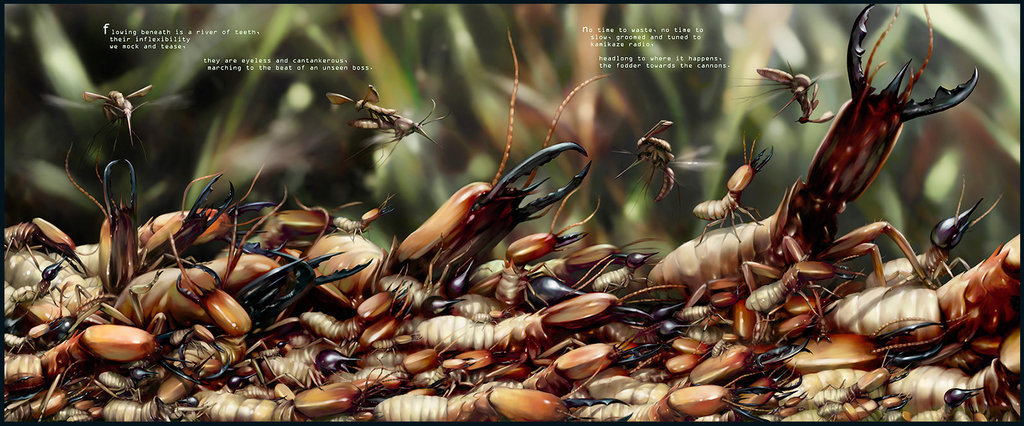
With most of the royal family, the senate, and the highest members of nobility killed, the empire was officially in a state of crisis. The various Legions across Orduin were either already destroyed or had begun their counterattack, with plans of their own.
In this time of crisis, some of the legion generals granted themselves emergency powers to try and salvage the situation. Some went off to become warlords and kings, however a small coalition of Imperial Generals remained united and played a key role in organizing a unified effort to beat back the bugs.
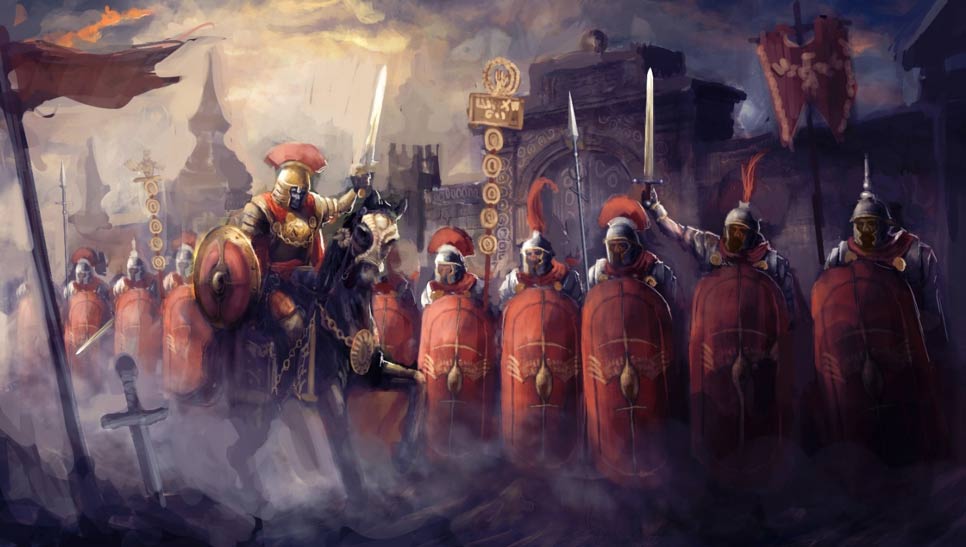
In the year 2425 the Valanor Accord had partaken in the push back of the Chitijian forces. To their disappointment however, rather than the empire reuniting, it began to break apart. Many would be rulers claimed to be the new "heir to the empire" while others declared full blown independence. The Accord made attempts to exercise their authority amongst the vassals of the empire, but could not even stop their fellow Imperial's from attempting to secede or seize power. This began the 200-year era of chaos in Ishtar.

The coalition of Legion Generals refused to admit defeat and returned to the Valanor region in which they controlled. They refused to relinquish their emergency powers, which persist to the modern day. The Generals organized a coalition of vassals and soldiers who were still seen as "loyalist" uniting them into a force intending to reunite the empire. This alliance, based primarily in the Valanor region was appropriately named the Valanor Accord.

After a decade of fighting, people began to question the legitimacy of the Accord's goals, especially when other powers had actual claim to the Imperial throne (little as it may be). The now formed Legionary Council decided to find the "true" heir to the empire and swear their oaths to serve them.
A man was brought in who was the bastard of the late emperor and a concubine, but claimed that the emperor had planned to set his wife aside for his mother and him. While dubious, it was enough for the Legionary council to latch onto.
The man was married to the governess of Itillia, and his line became that of the "new Imperial line" at least as far as the Accord was concerned.
During the 200 years of fighting the Accord had changed from an alliance to what was functionally a micro empire of sorts.
The ideals of the first Legionary Council have permanently altered the way the Accord developed, and while there were many cease-fires across the years, they would never last and before long the Accord was once more attempting to wrestle control of the empire from their rivals, with the capital city being their most tantalizing prize.
In the year 2617 IC, the Free Emirates of the Northern Wastes another faction that popped up after the fall of the empire, was subjugated by the forces of the Accord, and gifted to the Petty Kingdom of Ivenhoe.
In recent years, after a short hiatus; the efforts of the Accord to take the capital have doubled, in no small part thanks to Prince Nero, bastard son of the late "Emperor" and half-brother to "Emperor" Ancel. Acting as Ancel's regent, Nero has worked with the Legionary Council to reorganize and train thier forces into a competent fighting force.
However, tensions between the council and Nero have begun to grow, both sides claim the other is using the young Emperor as a puppet. At this same time, the Cult of Dumas have entrenched themselves into the lives of the court. Even the Legionary Council itself is divided. And whispers of a new threat circle in far off villages.
The Accord must ask itself if the survival of the alliance, of what they believe to be the true empire, is worth throwing away all that made it great in the first place.


With most of the royal family, the senate, and the highest members of nobility killed, the empire was officially in a state of crisis. The various Legions across Orduin were either already destroyed or had begun their counterattack, with plans of their own.
In this time of crisis, some of the legion generals granted themselves emergency powers to try and salvage the situation. Some went off to become warlords and kings, however a small coalition of Imperial Generals remained united and played a key role in organizing a unified effort to beat back the bugs.

In the year 2425 the Valanor Accord had partaken in the push back of the Chitijian forces. To their disappointment however, rather than the empire reuniting, it began to break apart. Many would be rulers claimed to be the new "heir to the empire" while others declared full blown independence. The Accord made attempts to exercise their authority amongst the vassals of the empire, but could not even stop their fellow Imperial's from attempting to secede or seize power. This began the 200-year era of chaos in Ishtar.

The coalition of Legion Generals refused to admit defeat and returned to the Valanor region in which they controlled. They refused to relinquish their emergency powers, which persist to the modern day. The Generals organized a coalition of vassals and soldiers who were still seen as "loyalist" uniting them into a force intending to reunite the empire. This alliance, based primarily in the Valanor region was appropriately named the Valanor Accord.

After a decade of fighting, people began to question the legitimacy of the Accord's goals, especially when other powers had actual claim to the Imperial throne (little as it may be). The now formed Legionary Council decided to find the "true" heir to the empire and swear their oaths to serve them.
A man was brought in who was the bastard of the late emperor and a concubine, but claimed that the emperor had planned to set his wife aside for his mother and him. While dubious, it was enough for the Legionary council to latch onto.
The man was married to the governess of Itillia, and his line became that of the "new Imperial line" at least as far as the Accord was concerned.
During the 200 years of fighting the Accord had changed from an alliance to what was functionally a micro empire of sorts.
The ideals of the first Legionary Council have permanently altered the way the Accord developed, and while there were many cease-fires across the years, they would never last and before long the Accord was once more attempting to wrestle control of the empire from their rivals, with the capital city being their most tantalizing prize.
In the year 2617 IC, the Free Emirates of the Northern Wastes another faction that popped up after the fall of the empire, was subjugated by the forces of the Accord, and gifted to the Petty Kingdom of Ivenhoe.
In recent years, after a short hiatus; the efforts of the Accord to take the capital have doubled, in no small part thanks to Prince Nero, bastard son of the late "Emperor" and half-brother to "Emperor" Ancel. Acting as Ancel's regent, Nero has worked with the Legionary Council to reorganize and train thier forces into a competent fighting force.
However, tensions between the council and Nero have begun to grow, both sides claim the other is using the young Emperor as a puppet. At this same time, the Cult of Dumas have entrenched themselves into the lives of the court. Even the Legionary Council itself is divided. And whispers of a new threat circle in far off villages.
The Accord must ask itself if the survival of the alliance, of what they believe to be the true empire, is worth throwing away all that made it great in the first place.

Government:
On paper the Valanor Accord claims to be the continuation of the Imperial Monarchy of the late Ourdin Empire. An Imperial Monarchy with an Emperor at its head. However, in reality, things are quite different.
The Accord itself is actually a coalition of former imperial territories, with various petty kings and governors declaring their support. The bulk of this alliance comes from the 4 petty kingdoms of Gathland, Hortshire, Saxland, and Ivenhoe. At the head of this coalition is the former Imperial province of Itillia.
The governors, petty monarchies, nobility, and other such leaders who sided with the coalition maintain most day-to-day control over their regions. However, they are utterly subservient to the Legionary Council, the true ruling body of the Accord.
The Legionary Council is made up of six generals who essentially have full authority to do as they please within the Accord. The Emperor only steps in to serve as a tiebreaker if the council is fractured down the middle on an issue or strategy.
Because of the "Emergency Powers" granted to the generals, they in turn must constantly be looking for ways to expand the Accord's territory and influence, in particularly towards taking over the capital.
There is also a royal court within the Emperor's castle. These ministers and officials are responsible for managing the Accord's capital and other policy making decisions that effect the greater realm.
This includes Imperial Chancellor, the Royal Chamberlain, The Minister of Ships, the Minister of Coin, the Arch Bishop, the Master of the Hunt, the Keeper of the Imperial Seal, and the Royal Justiciar to name a few. However, anything the royal court does that may interfere or even annoy the Legionary Council can be repealed by a majority vote amongst the Generals; essentially forcing members of the royal court to try to earn the favor of various generals in order to get policy passed.

The Accord itself is actually a coalition of former imperial territories, with various petty kings and governors declaring their support. The bulk of this alliance comes from the 4 petty kingdoms of Gathland, Hortshire, Saxland, and Ivenhoe. At the head of this coalition is the former Imperial province of Itillia.
The governors, petty monarchies, nobility, and other such leaders who sided with the coalition maintain most day-to-day control over their regions. However, they are utterly subservient to the Legionary Council, the true ruling body of the Accord.
The Legionary Council is made up of six generals who essentially have full authority to do as they please within the Accord. The Emperor only steps in to serve as a tiebreaker if the council is fractured down the middle on an issue or strategy.
Because of the "Emergency Powers" granted to the generals, they in turn must constantly be looking for ways to expand the Accord's territory and influence, in particularly towards taking over the capital.
There is also a royal court within the Emperor's castle. These ministers and officials are responsible for managing the Accord's capital and other policy making decisions that effect the greater realm.
This includes Imperial Chancellor, the Royal Chamberlain, The Minister of Ships, the Minister of Coin, the Arch Bishop, the Master of the Hunt, the Keeper of the Imperial Seal, and the Royal Justiciar to name a few. However, anything the royal court does that may interfere or even annoy the Legionary Council can be repealed by a majority vote amongst the Generals; essentially forcing members of the royal court to try to earn the favor of various generals in order to get policy passed.

Culture:
The Valanor Accord, has a unique culture that mixes the local ways (western/central Germanic cultures) with that of the late Orduin Empire. Since the empire's fall the lands united under the Accord have become deeply militarized, and national identity overhauled in a way that makes every citizen from crib to grave believe they are the true descendants of the Orduin Empire of old.
With that said there are some differences from location to location.
Itillia: The governing region of the Accord, it is paradoxically the most contested region, and the most highly populated. Itillia is a shining example of the cultural mash-up within the Accord’s lands.

Your average Accord soldier.
Elven Cities/Elves: There are three types of elves that live in Valanor.
Wood Elves: A type of elf that lives in the forest and is in touch with nature and the physical world. Very secular.

Light Elves: A term used to describe elves who dwell within their hidden cities. They are ethnically run of the mill elves, but descend from the old Navarros colonies within Valanor. Their homes are described as giant lanterns hanging from colossal trees, cliffsides, and caves. Somewhat Secular, but will make exceptions regularly.

Man-Elves: An elf who does not live a secular life, being born and raised amongst humans or at least living a similar lifestyle to that of their round ear compatriots.

The Four Petty Kingdoms.
Gathland: The heavily wooded region of the Accord. It births skilled trackers, huntsmen, and longbowmen. It is a decentralized land with powerful barons and honorable knights.

Hortshire: A land of rain, swamp, and hills. Their castles and soldiers are often decorated with a starkly gothic design, indicative of the men and women who live there. They say a knight of Hortshire never does anything just because.

Saxland: A land of mead halls and song. Of shield walls and faithful warriors. The least “advanced” of the four petty kingdoms, and yet perhaps the one with the most heart.

Ivenhoe: A land of chivalry and courtly love. A land of famine, sand, and trial. Despite the harsh environment this kingdom manages to produce the most honorable and pious of knights. The people of Ivenhoe are also masters of theological study and scholarly pursuits. Theological debate and discussion is so engraved into the culture that a full-on heretic would be treated with more respect than most non-believers.

With that said there are some differences from location to location.
Itillia: The governing region of the Accord, it is paradoxically the most contested region, and the most highly populated. Itillia is a shining example of the cultural mash-up within the Accord’s lands.

Your average Accord soldier.
Elven Cities/Elves: There are three types of elves that live in Valanor.
Wood Elves: A type of elf that lives in the forest and is in touch with nature and the physical world. Very secular.

Light Elves: A term used to describe elves who dwell within their hidden cities. They are ethnically run of the mill elves, but descend from the old Navarros colonies within Valanor. Their homes are described as giant lanterns hanging from colossal trees, cliffsides, and caves. Somewhat Secular, but will make exceptions regularly.

Man-Elves: An elf who does not live a secular life, being born and raised amongst humans or at least living a similar lifestyle to that of their round ear compatriots.

The Four Petty Kingdoms.
Gathland: The heavily wooded region of the Accord. It births skilled trackers, huntsmen, and longbowmen. It is a decentralized land with powerful barons and honorable knights.

Hortshire: A land of rain, swamp, and hills. Their castles and soldiers are often decorated with a starkly gothic design, indicative of the men and women who live there. They say a knight of Hortshire never does anything just because.

Saxland: A land of mead halls and song. Of shield walls and faithful warriors. The least “advanced” of the four petty kingdoms, and yet perhaps the one with the most heart.

Ivenhoe: A land of chivalry and courtly love. A land of famine, sand, and trial. Despite the harsh environment this kingdom manages to produce the most honorable and pious of knights. The people of Ivenhoe are also masters of theological study and scholarly pursuits. Theological debate and discussion is so engraved into the culture that a full-on heretic would be treated with more respect than most non-believers.

Religion:
Church of the One: a popular religion that had been around since before the Pinnacle War, however, did not reach wide-spread prominence until the era of peace brought about by Hesper's bloodline. It follows easy to understand concepts of right and wrong, which combined with its promise of forgiveness of sins has lead to wide popularity; and makes it very easy to proselytize pagan regions. They believe there is only a single god they call "The One", "One", or "He who is he, that who is that." They believe that all other gods are simply spirits of light, order, chaos, and darkness; whom while real, are not deities.
The One, chose to be born into this world years ago, making himself vulnerable to pain by taking on a physical form of a baby. He lived a human life and died a man before returning to his heavenly throne so that people may learn that no life is more valuable than another, and cannot be determined by outward success.
Holding many similarities with Zentarism, some say it is a human/elf focused branch sect that broke away years ago, while others claim it is the other way around. However scholars argue that the modern flavor of Zentarism is too recent for this to be the case. Other theologians subscribe to the idea that the pre-Pontifacia faith as well as the Church of the One may derive from and even older religion from the pre-Navarros days or beyond. Most of the core values and stories are similar. The key differences being superficial in nature, with the only noticeable ones being the role of mages in society, and the bureaucratic structure of the church.
The Church of the One is unisex in its upper clergy, with the lower ranks such as nuns and monks being more segregated. The Church is separated into three branches called houses.
⦁ The House of Prayer, led by She who speaks.
⦁ The House of Healing, led by He who tends.
⦁ The House of Arms, led by She who fights.
⦁ Above these three is He who seeks, the leader of the church.

Whenever someone from the three houses passes, the cardinals come together to vote upon a replacement. When He or She who seeks dies, they elect a candidate from among the three house leaders.
The church also has a group of sisters, called the “Sisters of Song”, nuns that either regretted/broke their vows, or otherwise wanted to take on a more proactive role in service of the church. These sisters are exempt from the laws of celibacy and serve as spies for the church. Once one completes their service to the church they are given the option to leave or continue their work. Most choose the latter.
There is also a group known as the "Toilers" which act as a male counterpart of the Sisters of Song, however unlike the sisters they do not get to keep their title, and are not considered part of the Church hierarchy.
Slavery in the Church of The One, is seen as not only an evil upon fellow souls, but a insult to the one true master The One. As all are equal under the light of The One from prince to popper, so too are the races and peoples of the world. This anti-slavery sentiment goes further when combined with the dislike of dark magics to create a dislike of necromancers, doubly so necromancers who use living souls; as it is seen as the greatest and cruelest form of slavery, baring souls form the heavens and trapping them in the mortal realm. While seemingly cut and dry the slave/undead debate has become quite nuanced amongst the Accord and even a little bit in the clergy of the Church. Still the Accord has taken on an anti-slavery stance in accordance to their majority faith.
Mages meanwhile, are expected to use their powers for good, and while they are not caged or enslaved, committing a crime with magic always yields a heftier punishment. There are also only certain kinds of magic that is considered taboo; typically, blood, dark, and other such magics that defile the source, and/or cannot be preformed without hurting another living being (even an evil one).
While there are always exceptions, most of the high clergy are made up of mages.
The One, chose to be born into this world years ago, making himself vulnerable to pain by taking on a physical form of a baby. He lived a human life and died a man before returning to his heavenly throne so that people may learn that no life is more valuable than another, and cannot be determined by outward success.
Holding many similarities with Zentarism, some say it is a human/elf focused branch sect that broke away years ago, while others claim it is the other way around. However scholars argue that the modern flavor of Zentarism is too recent for this to be the case. Other theologians subscribe to the idea that the pre-Pontifacia faith as well as the Church of the One may derive from and even older religion from the pre-Navarros days or beyond. Most of the core values and stories are similar. The key differences being superficial in nature, with the only noticeable ones being the role of mages in society, and the bureaucratic structure of the church.
The Church of the One is unisex in its upper clergy, with the lower ranks such as nuns and monks being more segregated. The Church is separated into three branches called houses.
⦁ The House of Prayer, led by She who speaks.
⦁ The House of Healing, led by He who tends.
⦁ The House of Arms, led by She who fights.
⦁ Above these three is He who seeks, the leader of the church.

Whenever someone from the three houses passes, the cardinals come together to vote upon a replacement. When He or She who seeks dies, they elect a candidate from among the three house leaders.
The church also has a group of sisters, called the “Sisters of Song”, nuns that either regretted/broke their vows, or otherwise wanted to take on a more proactive role in service of the church. These sisters are exempt from the laws of celibacy and serve as spies for the church. Once one completes their service to the church they are given the option to leave or continue their work. Most choose the latter.
There is also a group known as the "Toilers" which act as a male counterpart of the Sisters of Song, however unlike the sisters they do not get to keep their title, and are not considered part of the Church hierarchy.
Slavery in the Church of The One, is seen as not only an evil upon fellow souls, but a insult to the one true master The One. As all are equal under the light of The One from prince to popper, so too are the races and peoples of the world. This anti-slavery sentiment goes further when combined with the dislike of dark magics to create a dislike of necromancers, doubly so necromancers who use living souls; as it is seen as the greatest and cruelest form of slavery, baring souls form the heavens and trapping them in the mortal realm. While seemingly cut and dry the slave/undead debate has become quite nuanced amongst the Accord and even a little bit in the clergy of the Church. Still the Accord has taken on an anti-slavery stance in accordance to their majority faith.
Mages meanwhile, are expected to use their powers for good, and while they are not caged or enslaved, committing a crime with magic always yields a heftier punishment. There are also only certain kinds of magic that is considered taboo; typically, blood, dark, and other such magics that defile the source, and/or cannot be preformed without hurting another living being (even an evil one).
While there are always exceptions, most of the high clergy are made up of mages.
Cult of Dumaus: Despite the outward support and participation in the Church of the One, the Cult of Dumaus has its talons in the royal court; whispering sweet nothings and promises into the ears of the Accord's leadership. They worship an eldritch deity named Dumas from a place they call "The Abyss" and have backed their claims with dark magics and "Signs of love" that would be described as miracles if they did not come with such a terrible price.

Unchecked magic and blood rites are commonplace within the cult, who encourage hedonism and debauchery amongst its followers, while singing that madness is the apex of enlightenment. They believe the only deity worthy of worship is one who waits on its followers like a doting parent, showering them in endless love, in return for their own endless affection. They prove their love through their dark deeds, and wicked actions.

The leaders of the Accord have convinced themselves that THEY control the cult, not the other way around. However, every day more and more nobility and ministers submit to the cult's demands while the Legionary Council do nothing, out of ignorance of the cult's actions/deeds/intentions, refusal to see the true danger they present, or fear of loosing the proven and needed support of this cult in their war efforts.


The cult was brought to court by Prince Nero, who was searching for new allies to support his own efforts of not only putting his half brother on the Imperial throne, but reclaiming control of the Accord from the Legionary council. The cult's current leader is a young girl named Luci, who has gardened Emperor Ancel's ear due to their closeness in age, and a childish desire for a friend from the young ruler.

Unchecked magic and blood rites are commonplace within the cult, who encourage hedonism and debauchery amongst its followers, while singing that madness is the apex of enlightenment. They believe the only deity worthy of worship is one who waits on its followers like a doting parent, showering them in endless love, in return for their own endless affection. They prove their love through their dark deeds, and wicked actions.

The leaders of the Accord have convinced themselves that THEY control the cult, not the other way around. However, every day more and more nobility and ministers submit to the cult's demands while the Legionary Council do nothing, out of ignorance of the cult's actions/deeds/intentions, refusal to see the true danger they present, or fear of loosing the proven and needed support of this cult in their war efforts.


The cult was brought to court by Prince Nero, who was searching for new allies to support his own efforts of not only putting his half brother on the Imperial throne, but reclaiming control of the Accord from the Legionary council. The cult's current leader is a young girl named Luci, who has gardened Emperor Ancel's ear due to their closeness in age, and a childish desire for a friend from the young ruler.
Economy:
The Valanor Accord is in a constant state of war-time economy, even when they form an armistice with larger foes it is only so they can deal with internal threats or smaller factions. It is to the point of which if they ever achieved their goal and finally reformed the empire, the economy would completely collapse in on itself. Even so, while their ultimate goal is to reform the whole empire, they are not against committing to trade with other factions in the meantime.
The Valanor Accord trades in game, furs, fish (both fresh and sault water), textiles, linen, as well as agriculture; with wheat, oats, and barley as the favored crops and sheep, lamb, and goat being of particular value in the area.
Ivenhoe offers vineyards of desert wine, while Hortshire brings plants and animals from the rare swampy regions of Ishtar.
Saxland produces honey, and mead, as well as some beef cattle. Gathland, while being head of the fur and game trade in Valanor, also produce lumber from the forest which is also processed into boards useable wood.
In order to maintain the legions, local lords employ any who are willing to work. More hands are always required, with most of the young men joining one of the legions. Thus many who previously would be passed up for work find themselves with a job available.
Iron and other metals are of the highest concern. "The Fissure" (the mountain surrounded by swamp land on the map.) provides significant sums of iron, however it is only a matter of time until it runs dry. Meanwhile the Ivenhoe river's quarry provides stone for the Accord as well as buyers beyond.
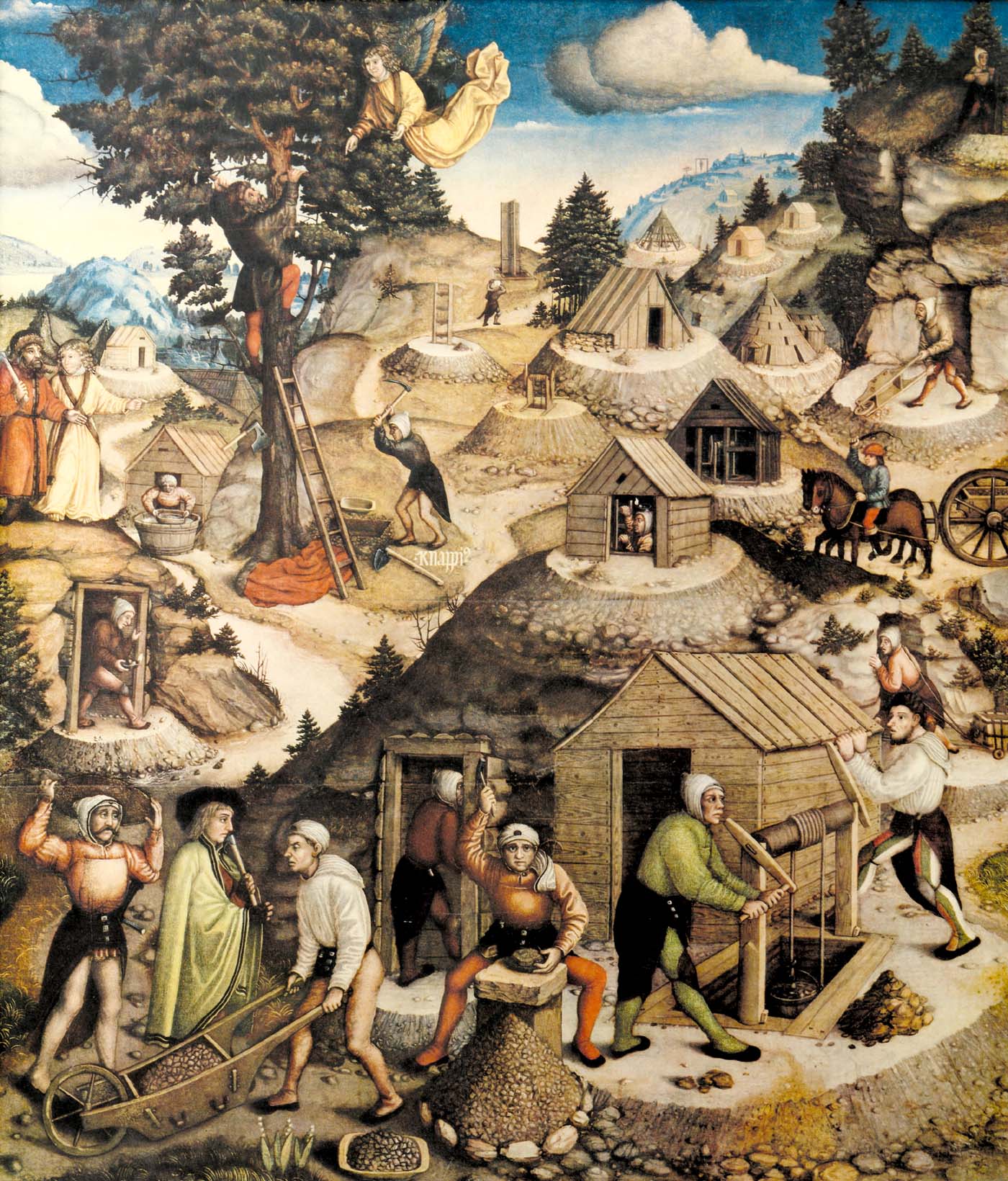
The Valanor Accord trades in game, furs, fish (both fresh and sault water), textiles, linen, as well as agriculture; with wheat, oats, and barley as the favored crops and sheep, lamb, and goat being of particular value in the area.
Ivenhoe offers vineyards of desert wine, while Hortshire brings plants and animals from the rare swampy regions of Ishtar.
Saxland produces honey, and mead, as well as some beef cattle. Gathland, while being head of the fur and game trade in Valanor, also produce lumber from the forest which is also processed into boards useable wood.
In order to maintain the legions, local lords employ any who are willing to work. More hands are always required, with most of the young men joining one of the legions. Thus many who previously would be passed up for work find themselves with a job available.
Iron and other metals are of the highest concern. "The Fissure" (the mountain surrounded by swamp land on the map.) provides significant sums of iron, however it is only a matter of time until it runs dry. Meanwhile the Ivenhoe river's quarry provides stone for the Accord as well as buyers beyond.

Military:
The military is almost entirely under the control of the Legionary Council. While the Accord has found itself on occasion to require the aid of levies, they much prefer the discipline and training of the Accord's legions, which trace their roots to (and are a shadow of depending on who you ask) the Legions of the Orduin Empire.
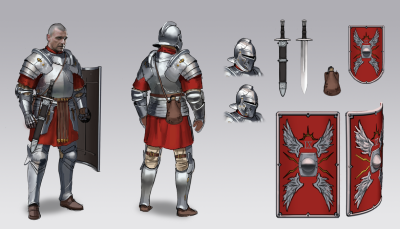
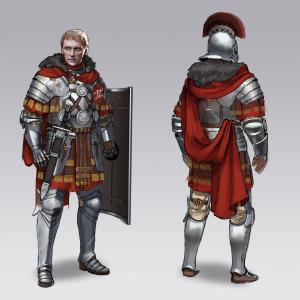
Each general on the Legionary Council is given control of a single legion. However, whether these armies are large enough to be considered legitimate legions is a whole different matter. Each general is responsible for keeping their legion feed, and taken care of. Most legions are made up of trained legionnaires however in cases of larger scale campaigns, levies from the other Accord controlled lands will be raised to join the fight.
The title of knight doesn't carry over any weight within the legion. it is possible to be an anointed knight and still be a common foot soldier in the legion's forces. However, because by nature knights are pre-trained, own their own horses and equipment, and generally have more military experience than a grunt, they rise through the ranks quickly, or are transferred to a cavalier unit if they already have a horse.

There is no laws regarding what legion you can join. A soldier of Saxland can at anytime sign up with a legion that may even be ran by foreign ruler. Such as General Hexilda.
With that in mind, there are no rules about who can become a member of the Legionary Council, so long as they are a citizen of the Accord and have earned their rank. Thus, in the case of General Hexilda, the Queen of the petty kingdom of Gathland; she was able to rise through the ranks to become a General of her legion.
Of course, while technically, anyone can become a general, those born into nobility or families with a military pedigree naturally have more training and higher educations that lead to them almost always taking higher ranks within the legion.

Included in the Legions (and the subsequent forces of other Accord member states) are a variety of more specialized troops that give the Accord an edge in battle. This includes the wolf riders, a specialized cavalry unit that has origins in old elven tradition but has now expanded to humans.
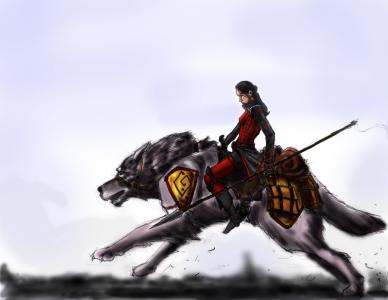

Every Legion is accompanied by a group of Imperial Battle Mages, trained in the art of combat. In order to prevent their own spells from hurting their comrades the Imperial Mages must be well disciplined and be level-headed in a battlefield situation.
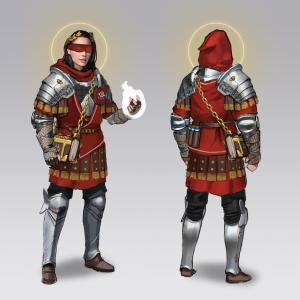
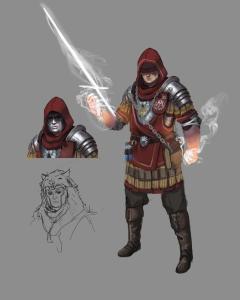
Thus every group of experienced Imperial Mages are accompanied by a group of novice or apprentice mages; who play only a limited role in the battle, and mostly observe their elders, draw minor incantation circles, carry fragile magic supplies, and handling low priority grunt work. Through this, the novice mages become accustomed to the battlefield and are ready to be full-fledged battle mages by the time they become official battle-mages of the Legion.
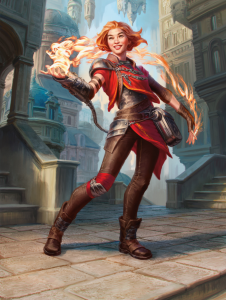
In the Imperial Capital, there is a group known as the Royal Guard, a cohort of soldiers that serve as the Emperor's personal military force. However, it is well known that the loyalties of the Royal Guard are not something to be assumed. While many would die for the Emperor, many more obey the will of the Legionary Council.

There have also been whispers of strange and unnatural creatures taking form in the darkest dungeons of the Accord's capital. Could there be a military application to these beast of despair?
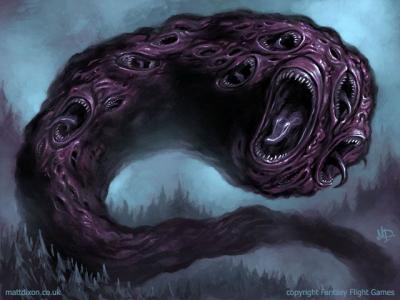


Each general on the Legionary Council is given control of a single legion. However, whether these armies are large enough to be considered legitimate legions is a whole different matter. Each general is responsible for keeping their legion feed, and taken care of. Most legions are made up of trained legionnaires however in cases of larger scale campaigns, levies from the other Accord controlled lands will be raised to join the fight.
The title of knight doesn't carry over any weight within the legion. it is possible to be an anointed knight and still be a common foot soldier in the legion's forces. However, because by nature knights are pre-trained, own their own horses and equipment, and generally have more military experience than a grunt, they rise through the ranks quickly, or are transferred to a cavalier unit if they already have a horse.

There is no laws regarding what legion you can join. A soldier of Saxland can at anytime sign up with a legion that may even be ran by foreign ruler. Such as General Hexilda.
With that in mind, there are no rules about who can become a member of the Legionary Council, so long as they are a citizen of the Accord and have earned their rank. Thus, in the case of General Hexilda, the Queen of the petty kingdom of Gathland; she was able to rise through the ranks to become a General of her legion.
Of course, while technically, anyone can become a general, those born into nobility or families with a military pedigree naturally have more training and higher educations that lead to them almost always taking higher ranks within the legion.

Included in the Legions (and the subsequent forces of other Accord member states) are a variety of more specialized troops that give the Accord an edge in battle. This includes the wolf riders, a specialized cavalry unit that has origins in old elven tradition but has now expanded to humans.


Every Legion is accompanied by a group of Imperial Battle Mages, trained in the art of combat. In order to prevent their own spells from hurting their comrades the Imperial Mages must be well disciplined and be level-headed in a battlefield situation.


Thus every group of experienced Imperial Mages are accompanied by a group of novice or apprentice mages; who play only a limited role in the battle, and mostly observe their elders, draw minor incantation circles, carry fragile magic supplies, and handling low priority grunt work. Through this, the novice mages become accustomed to the battlefield and are ready to be full-fledged battle mages by the time they become official battle-mages of the Legion.

In the Imperial Capital, there is a group known as the Royal Guard, a cohort of soldiers that serve as the Emperor's personal military force. However, it is well known that the loyalties of the Royal Guard are not something to be assumed. While many would die for the Emperor, many more obey the will of the Legionary Council.

There have also been whispers of strange and unnatural creatures taking form in the darkest dungeons of the Accord's capital. Could there be a military application to these beast of despair?

The Imperial Navy, is a decently sized maritime institution that is technically outside of the control of the Legionary Council. The Minister of Ships, is supposed to be the authority; however he is more of a bureaucrat that rarely leaves the Imperial court.
In practice most of the navy is watch over by the Master Admiral, along with the two Fleet Admirals. However, despite having no legal control over the navy, the Legionary Council has great influence on who rises through the ranks, and have no calms about getting the Minister of Ships to remove any who cause problems from their positions.
The Imperial Navy is funded and manned as a joint collaboration of all Accord members (much like the Legions). Some Accord kingdoms such as Saxland and Gathland own and maintain personal navies loyal to their lords and homelands, however they are small and pose no threat to the Imperial Navy.
Even the elven communities within the Accord provide some man-power or ships to the Imperial Navy, with some of the fastest ships being from the elven cities on the coast.

The navy itself is made up of two fleets, both commanded by a Fleet Admiral. These fleets are further separated into two sub-fleets, with both preforming a different objective.
The first sub-fleet is made up of warships and galleys, meant for fighting and sinking enemy ships, as well as launching bombardments against the coast. In addition most of these ships have a sizable numbers of warriors to serve as boarding parties or raiding bands against coastal targets.



The other sub-fleet is primarily focused around the transportation of troops, utilizing a variety of boat and ship types, big and small.


Saxland has offered much of its boat building expertise, providing many long boats that can carry a substantial amount of men great distances in short amounts of time; and can easily be used in rivers, lakes, and can even be picked up and carried on foot by legion soldiers.

Conversely the Imperial Navy also has access to large ships that, while slow, can carry a great number of troops, supplies, and resources to any destination along the coast.


In practice most of the navy is watch over by the Master Admiral, along with the two Fleet Admirals. However, despite having no legal control over the navy, the Legionary Council has great influence on who rises through the ranks, and have no calms about getting the Minister of Ships to remove any who cause problems from their positions.
The Imperial Navy is funded and manned as a joint collaboration of all Accord members (much like the Legions). Some Accord kingdoms such as Saxland and Gathland own and maintain personal navies loyal to their lords and homelands, however they are small and pose no threat to the Imperial Navy.
Even the elven communities within the Accord provide some man-power or ships to the Imperial Navy, with some of the fastest ships being from the elven cities on the coast.

The navy itself is made up of two fleets, both commanded by a Fleet Admiral. These fleets are further separated into two sub-fleets, with both preforming a different objective.
The first sub-fleet is made up of warships and galleys, meant for fighting and sinking enemy ships, as well as launching bombardments against the coast. In addition most of these ships have a sizable numbers of warriors to serve as boarding parties or raiding bands against coastal targets.



The other sub-fleet is primarily focused around the transportation of troops, utilizing a variety of boat and ship types, big and small.


Saxland has offered much of its boat building expertise, providing many long boats that can carry a substantial amount of men great distances in short amounts of time; and can easily be used in rivers, lakes, and can even be picked up and carried on foot by legion soldiers.

Conversely the Imperial Navy also has access to large ships that, while slow, can carry a great number of troops, supplies, and resources to any destination along the coast.


There are a variety of private organizations within Valanor, most of them under the label of an "Order" of some kind. Separating themselves from the scientific and monastic orders are the militant knightly orders. There are many knightly orders; most being holy orders of some kind. Amongst these holy orders some have stronger connections to the Church of the One than others.
The Truelight Order: Is a knightly order based in Ivenhoe and the surrounding region. It has heavy connections with the Church of the One. They were once a more monastic order, however over the years they have become more militarized; which has changed the core tenets in various areas. The order believes that they must defend the Church of the One from outside threats, and must be the sheep-dogs of the faithful. It was once frowned upon for knights to have children or take on lovers, and while marriage itself is still not allowed, getting caught in a night of passion is no longer enough to get you removed from the order, in fact bastards are likely to be taken in and trained in the order's ways. The order was also once separated into two houses by gender, but this also has been phased out as the order has become less concerned with any duties other than getting boots on the ground, and occupying cities and regions of East Valanor.
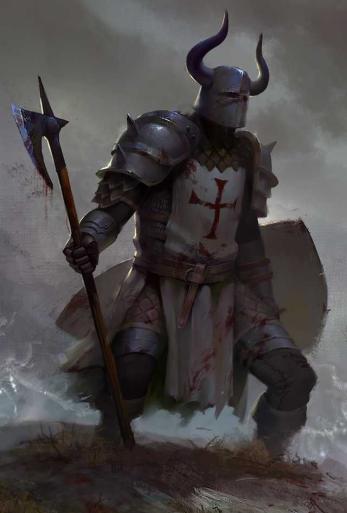
The Order of Saint Justinian: Led by the Imperial Justicar Lady Zamoria, while technically a holy order of sorts, it holds a thin connection to the Church of the One, held only by its name and its willingness to work with other orders and the House of Arms. While other orders have a wide range of tasks and jobs, the Order of Saint Justinian focuses only on upholding a chaotic sense of "Justice" with the tracking, killing, and punishment of criminals being the Order's obsession.

The order believes that a heavy hand must be used to punish the wicked and scare the weak willed. Their code of absolute justice takes them all over the Valanor Accord and beyond, striking down lowly bandit and corrupt nobleman alike. Nobody is truly safe from the order's gaze. While the order has on occasion allowed a criminal to go free or didn't go after a noble of clergy member abusing their authority; it was only so that they may track down more criminals, collect evidence (or what little they need to act on), or otherwise position themselves to make their attempts at passing judgment go more smoothly.
They are mostly a nomadic order that travels often seeking new criminals to punish, although they do have a base at Castle Voldwen, a castle on the Ivenhoe-Hortshire border that belongs to Lady Zamoria and her family. Their members are said to ordain themselves in golden armor (although it usually little more than a dye).

The Dark Legion: A group founded by former imperial legionaries who were either disgraced, dishonored, or where removed from, resigned from, or failed to enter the Orduin Empire Legions. It took serious form a year or so before the fall of the Orduin Empire, and used the fall and the subsequent chaos to build up its power base. Serving as a mercenary band of sorts they fought in many battles, although the money was always a secondary concern; and many times they would fight with no reason at all.
They took over and renovated "The Eye" an old Imperial Fortress in the far northern regions, outside of Accord territory, as they continued to absorb many who fell or left the legion into their ranks. Eventually they began recruiting barbarians, bandits, elves, vaala, beastmen, and any others who could pass their tests.
They have no connection to the Church of the One in any form, and don't seem to hold any real doctrine beyond baptism by fire, love of war, and a desire to reform their own version the Orduin Empire into their ideal vision (A Orduin Empire large enough to influence the politics of other nations, but just enough so that other superpower nations can continuously rise up to fight them.)
The current leader of the Dark Legion has made increasing attempts to involve the order in politics, increasing its standing to be on par with that of similar knightly orders, if not out of respect, out of fear.
The Truelight Order: Is a knightly order based in Ivenhoe and the surrounding region. It has heavy connections with the Church of the One. They were once a more monastic order, however over the years they have become more militarized; which has changed the core tenets in various areas. The order believes that they must defend the Church of the One from outside threats, and must be the sheep-dogs of the faithful. It was once frowned upon for knights to have children or take on lovers, and while marriage itself is still not allowed, getting caught in a night of passion is no longer enough to get you removed from the order, in fact bastards are likely to be taken in and trained in the order's ways. The order was also once separated into two houses by gender, but this also has been phased out as the order has become less concerned with any duties other than getting boots on the ground, and occupying cities and regions of East Valanor.

The Order of Saint Justinian: Led by the Imperial Justicar Lady Zamoria, while technically a holy order of sorts, it holds a thin connection to the Church of the One, held only by its name and its willingness to work with other orders and the House of Arms. While other orders have a wide range of tasks and jobs, the Order of Saint Justinian focuses only on upholding a chaotic sense of "Justice" with the tracking, killing, and punishment of criminals being the Order's obsession.

The order believes that a heavy hand must be used to punish the wicked and scare the weak willed. Their code of absolute justice takes them all over the Valanor Accord and beyond, striking down lowly bandit and corrupt nobleman alike. Nobody is truly safe from the order's gaze. While the order has on occasion allowed a criminal to go free or didn't go after a noble of clergy member abusing their authority; it was only so that they may track down more criminals, collect evidence (or what little they need to act on), or otherwise position themselves to make their attempts at passing judgment go more smoothly.
They are mostly a nomadic order that travels often seeking new criminals to punish, although they do have a base at Castle Voldwen, a castle on the Ivenhoe-Hortshire border that belongs to Lady Zamoria and her family. Their members are said to ordain themselves in golden armor (although it usually little more than a dye).

The Dark Legion: A group founded by former imperial legionaries who were either disgraced, dishonored, or where removed from, resigned from, or failed to enter the Orduin Empire Legions. It took serious form a year or so before the fall of the Orduin Empire, and used the fall and the subsequent chaos to build up its power base. Serving as a mercenary band of sorts they fought in many battles, although the money was always a secondary concern; and many times they would fight with no reason at all.
They took over and renovated "The Eye" an old Imperial Fortress in the far northern regions, outside of Accord territory, as they continued to absorb many who fell or left the legion into their ranks. Eventually they began recruiting barbarians, bandits, elves, vaala, beastmen, and any others who could pass their tests.
They have no connection to the Church of the One in any form, and don't seem to hold any real doctrine beyond baptism by fire, love of war, and a desire to reform their own version the Orduin Empire into their ideal vision (A Orduin Empire large enough to influence the politics of other nations, but just enough so that other superpower nations can continuously rise up to fight them.)
The current leader of the Dark Legion has made increasing attempts to involve the order in politics, increasing its standing to be on par with that of similar knightly orders, if not out of respect, out of fear.

Notable Figures:
"Emperor" Ancel: The boy ruler of the Accord, many claim he has the blood of Imperial Royalty in his veins, although this claim was and still is dubious. He is a sheltered youth, who wishes to appease his followers but is bared from most social interaction and kept from learning how to run the empire by the powers at play around him. He enjoys the antics of court jesters and royal fools.


Prince Nero: Half-brother of Ancel, brother of Cipher; he has always looked after the young emperor, and now seeks to claim the once great Imperial Throne in his name. He is a brooding individual, who bottles up his anger and emotions for the sake of his long-term political aspirations. He understands that the Imperial Legions need the leadership of the Legionary Council if the Accord ever hopes of reviving the Orduin Empire, and thus attempts to balance working with them and against them in the political realm.


Princess Cipher: Half-sister of Ancel, sister of Nero. Known as a berserker of sorts, she is a savage warrior who revels in battle. She is deeply loyal to her brothers, believing that only she and Nero can make Ancel into the Emperor he is meant to be. She desires to drop all pretenses and simply kill all their political enemies in a ambush. However she trusts the judgment of Nero enough to not cause any political blow-back. For now.


General Glazer: Head of the 1rst Legion, and a descendent of a powerful Orduin Empire general who led his legion against the bugs during the fall of the empire; and later founded the Valanor Accord. Glazer’s father, grandfather, and great grandfather all held a position on the Legionary Council, and his pedigree is backed by his ability to lead armies. He sits as the foremost head of the Legionary Council, with the others often deferring to his judgment. Many say that he is the true leader of the Valanor Accord.
He desires to maintain control over the Accord, thus he attempts to keep Ancel out of politics so that he cannot threaten the authority of the Legionary Council before it can reunite the empire. Glazer cares little for royal blood and sees the line of Hesper as nothing more than a convenient tool to rally the legions behind.
A methodical man, he often gets upset when unexpected things occur. He has no patience for the corruption or any activity that may interfere with the Legion's goals. He believes the chaos of the land can only be quelled by the hands of a strong empire.

He desires to maintain control over the Accord, thus he attempts to keep Ancel out of politics so that he cannot threaten the authority of the Legionary Council before it can reunite the empire. Glazer cares little for royal blood and sees the line of Hesper as nothing more than a convenient tool to rally the legions behind.
A methodical man, he often gets upset when unexpected things occur. He has no patience for the corruption or any activity that may interfere with the Legion's goals. He believes the chaos of the land can only be quelled by the hands of a strong empire.

General Hyperion: Head of the 2nd Legion. An older woman, who has had years of experience serving in the legion. She has outlived her entire family, including her own children, thus she lives life indulgently, yet fully; enjoying as much food, sex, drink, song, and battle as she can while fighting on the front lines ready for death to claim her in battle. Much to the annoyance of her fellow generals.


General Zeal: Head of the 3rd Legion. She is an elven noble woman, who represents the elven cities that reside within Accord territory. Despite her elven heritage she is one of Ancel's greatest supporters, although she often believes only she knows what is best for the young ruler. She legitimately believes that Ancel would be better off doing whatever the Legionary Council says, and thinks Nero and Cipher are needlessly putting the boy and the Empire at risk.


General Apocrypha: Head of the 4th Legion. A man scarred by magic, and fueled by great intent. He is the subject of a botched attempt to gain immortality by a mage who visited his family’s lands. Under his mask is an odd and frightening combination of a young boy and an old man. With parts of his body having been aged back and other parts aged forward. He has an extraordinary understanding of magic for a non-mage and knows how to kill them almost as well as one born with anit-magic.
Many fear him as the Valanor Reaper, while others dub him the "Mage's Bane" with all viewing him as the most brutal of the Legionary Council.

Many fear him as the Valanor Reaper, while others dub him the "Mage's Bane" with all viewing him as the most brutal of the Legionary Council.

General Giaus: Head of the 5th Legion. A straightforward man, he is a very orthodox general. He has a talent for not overthinking situations and is seen as the most approachable of the Legionary Council. He is well versed in the lingo and goings on within the mercenary community, hiring many foreign soldiers, in hopes of them adding the element of the unexpected to his strategies.


General Hexilda: The new queen of the petty kingdom of Gathland and head of the 6th Legion. As a general on the Legionary council she is able to help her kingdom in many ways, while also having an easier time restocking on soldiers and supplies due to her connections. Despite having preference for her own kingdom over the rest of the Accord, she fully believes that the only way to keep her home safe is for the Orduin Empire to return, or at least for the Accord to expand into its own great power.


Prince Pureion: Prince of Gathland, brother of Hexilda. He is betrothed to Princess Cipher, but the wedding has been post-phoned due to the war. He has a very reserved attitude towards things, almost seeming rude or uncaring to some. However, deep down he does desire to be the best prince and knight he can be.


Ser Hawthorne: An honorable and courageous knight of Ivenhoe, he fights under General Apocrypha. Many have called him the greatest warrior in all the six legions. He is a tender man who truly desires to live the life of an honest knight despite the fact that the world itself seems to encourage him down the path of villainy.


Dame Alexius: A knight of Itillia, she serves General Apocrypha. She has complete and utter devotion towards the Accord’s cause; fighting with a fanatical zeal to claim the throne for Emperor Ancel. She is well liked by her troops, who find her fanatical passion to be contagious.


Luci: The leader of the Cult of Dumas. She has dug her claws into the royal court, slowly corroding the halls of great warriors and generals into a pit of despair and malice. She is slowly taking over the Accord with her followers, becoming ever more bold in her depravities.


Head of the House of Prayer. She is the foremost authority on ceremony, sermons, theological study, scholarly pursuits, and missionary efforts within the church. She is a skilled mage, and a well known intellectual within the scholarly community, with even non-believers sending for her advise on matters of science, government, history, arithmetic, theology, and philosophy.
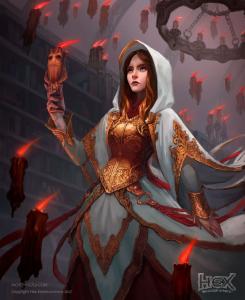

Head of the House of Healing. His main job is overseeing all of the church's charity endeavors, alms giving, hospital construction and maintenance, organizing battlefield medical services, ensuring the protection and health of prostitutes, researching medicine and healing magic, giving food and medical treatment to the poor and crippled, opening and maintaining orphanages, and praying for the sick and poor. He is a very skilled mage who focuses on healing spells. He is also a master in all knowledge of the medical arts, both local and foreign.
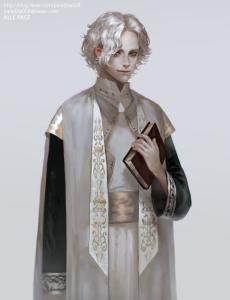

Head of the House of Arms, and currently the youngest member to ever reach her position. Her main job is the organization and command of all the church's militant branches, including retinues, levies, and the army of the church. She keeps track of all Holy Orders, ensuring they are following the path of piety and righteousness. She oversees the actions of any organizations affiliated with the church, officially or unofficially; including spies, and mage-hunters. She is responsible for hunting down any users of corrupted magics, or mages who have decided to use their powers for evil. She is a very powerful energy mage, who earned her position through her strength alone.
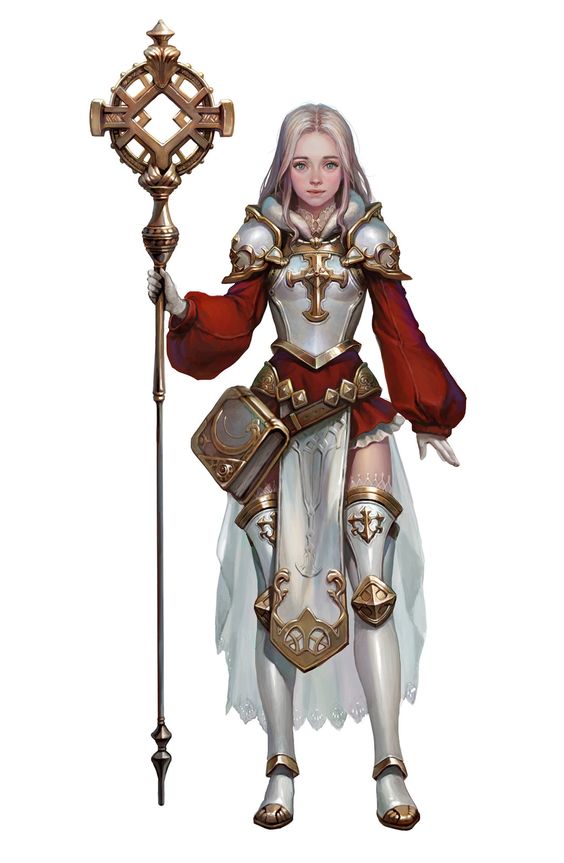

The Leader of the Church of the One. He is both a symbol, as well as an administrator of the entire organization. While he has many ceremonial and administrative tasks, his main job is diplomacy. He not only keeps relations within and without of the church on good terms, but often attempts to intercede between other kingdoms as well. He Who Seeks also has the important duty of directing the efforts of the church over all. While ultimately he cannot be everywhere at once, and there are plenty who will outright ignore his orders; there is still significant impact on the issues he chooses to focus on, not only in the Accord, but the entirety of the faithful throughout Ishtar. He is a very talented light mage, although not as powerful as he once was in his youth. He is also a lover of games, tricks, and pranks. It is said that he obsesses over riddles and is also a fan of gambling and games of chance.


Queen Mother of the Valanor Accord. She is protective of her son, having lived through a politcal crises when her own family tore itself apart. She would rather her son live as a puppet than die attempting to take power from the Legionary Council. She puts on a show for the rest of the court, presenting herself as a cold woman who will not be trifled with.
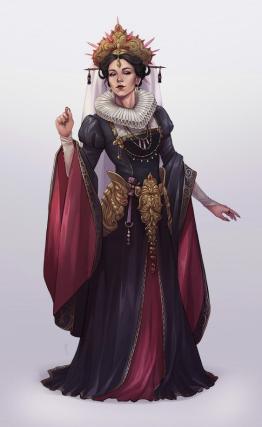

The Imperial Chancellor and Prime Minister. He is an elderly man who has had much experience in the political realm. He is one of the few who has some amount of respect from the Legionary Council. He is often willing to speak frankly about the political situation. He once served in the Legion but gave it up for a life in politics.


The Keeper of the Imperial Seal, and Minister of Laws. A master schemer she appeared to the Imperial Court when Ancel's father was still Emperor as a mere courtier. Using her manipulations she slowly rose in prominence gaining the attention of the Legionary Council who allied with her in exchange for her own cooperation. She wants even more power, and desires to get into the Emperor's inner circle.
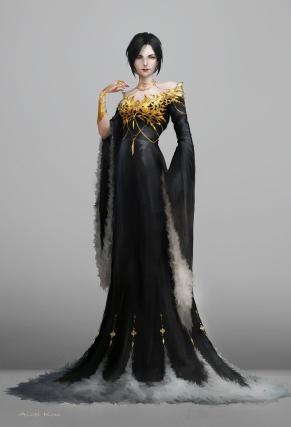

The Minister of Coin, and old friend of Ser Hawthorne. He is considered a no-good snake by most of his fellows in the court and isn't well liked by anyone; least of all the Legionary Council. Even still he keeps his position through his skill at stewardship, administration, and finances.
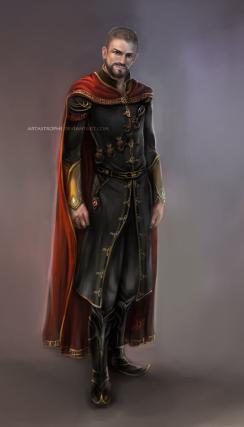

The Minister of Ships. He is an older man who is seen as a pushover by most of the Imperial Court. However, he is the one who focuses the most on his actual job and less on scheming and gaining power. Thus he has respect from those who value humility and contentment. He follows the will of the Legionary council.
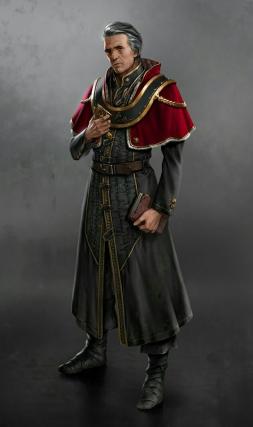

The Imperial Justiciar, she is very harsh with her judgments; following a doctrine of absolute and unforgiving justice. She is a former legionnaire, who was kicked out for attacking a superior. She started up a knightly order called the Order of Saint Justinian(The Saint of Justice). Her knightly order became too big to ignore and she was made the Imperial Justiciar so the Legionary Council could keep an eye on her; being sure to neuter the authority and power of her position as much as possible.
She is currently away bringing "Order" to the frontier regions of the Accord.

She is currently away bringing "Order" to the frontier regions of the Accord.

The Master of the Hunt, and Master of the Horse. He is an aspiring lord from Saxland, who managed to claw his way to the capital. Despite his titles being mostly honorary ones, he takes his duties seriously. He is in charge of organizing hunts, dealing with poachers, and generally taking care of the Imperial forest as well as the horses within the capital, including that of the Emperor and the royal family. He desires a position with more political clout.
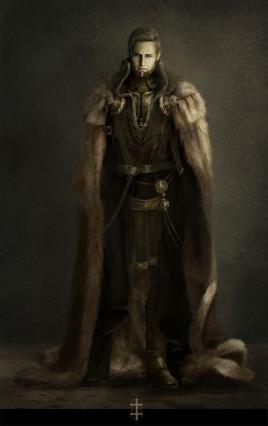

The Imperial Court Mage. He is a man with few inhibiters and is audacious in his political scheming to the point where he barely tries to hide it. He is powerful in both spells and with his words; and is one of the first to welcome the Cult of Dumas into the Imperial Court. He has a fascination for the ancient magics of Ishtar, including the magic that created the Pale.
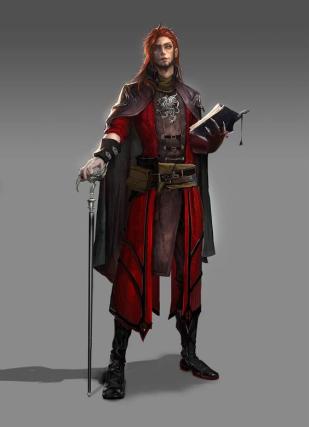

The Minister of Agriculture, she is a reserved woman who doesn't telegraph her political agendas easily. She comes off as gentle and even docile, but she is constantly evaluating the shifting of powers within the court.
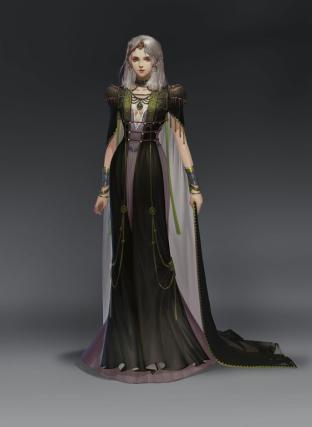

The Keeper of Swans, and Royal Custodian. She cares for the Imperial gardens, and various ceremonial task throughout the castle. She is young for her position, however that only works to her advantage, politically ruining many who underestimated her.
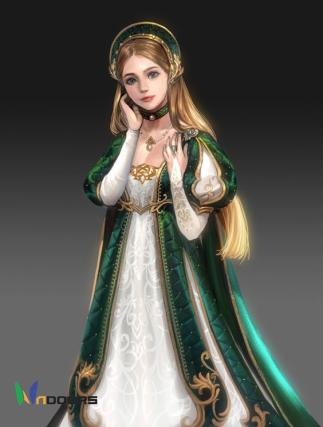

The Minister of Trade, he works closely with the Minister of Coin. A member of elven nobility from one of the elven cities in Ivenhoe, he is well versed in language and foreign theology. He isn't well liked by many of his fellow elves.


The Minister of War, and the Master-at-Arms. He is a loyalist to the Legionary Council, however he secretly despises them, believing they do not offer him the proper respect he deserves for his position. He joined the legion as a youth but had to quit when his father began butting heads with them in order not to be used against his family. Despite believing in the council's cause he has never forgiven the Legionary Council for what they did (even if there has been a full turn-over in leadership by now).
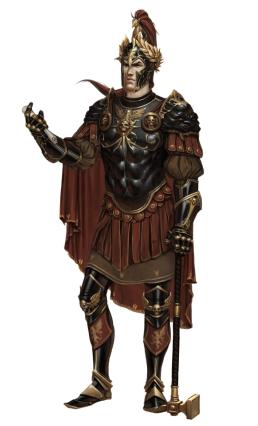

Archbishop of Itillia, and chaplain of the Imperial Court. He is a lover of wines and other forms of drink. He is usually a quiet figure in the court, and few know for sure where he will stand on things politically.
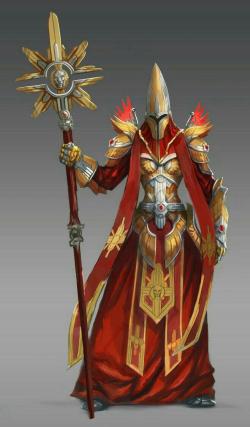

Royal Jester of the Imperial Court, and the Accord's Spymaster. She was an elf from one of the southern nations who made her way northward as a traveling charlatan. She doubled as an information broker and had connections everywhere. When she was imprisoned for spying on Legion strategy meetings, Ancel (mistaking her for a regular clown) appointed her his royal fool. After some time she managed to earn the tolerance of the Imperial Court and the cooperation of the Legionary Council; although she is still not well liked for her antics.
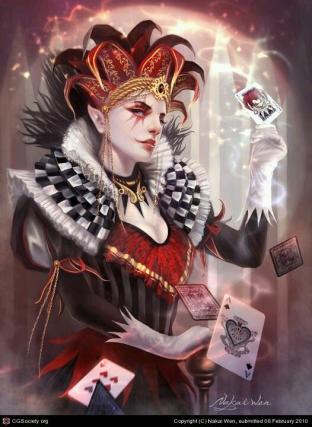

The Royal Chamberlain of the Imperial Household. She is a former handmaiden to the Queen Mother, and plans out many of the day to day activites of Ancel and the Imperial Household. She comes from outside of the Accord.
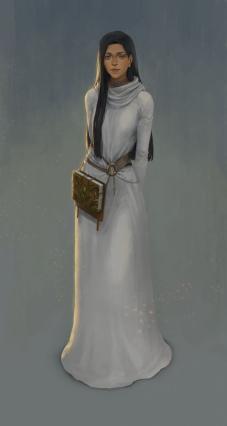

One of Ancel's attendants and a member of the Sisters of Song. She serves as an additional spymaster, and bodyguard for the young Emperor.
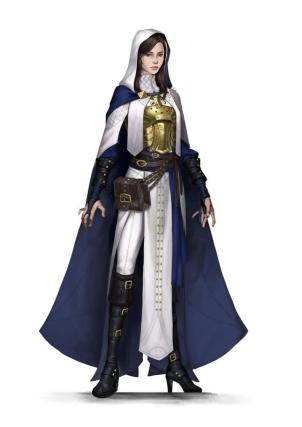

A knight of Hortshire, and a member of the Royal Guard. He is distant and quiet, leaving many to suspect his loyalties. Some say he is actually the Emperor's jailer.


Mother of Nero and Cipher. She was the former Emperor's lover but the Legionary Council at the time prevented them from marrying, and later commanded she be set aside for the more strategic marriage to Lady Selene.

